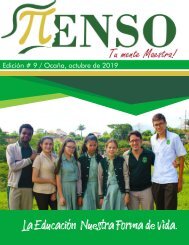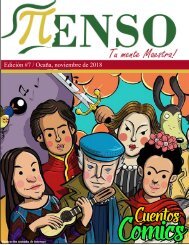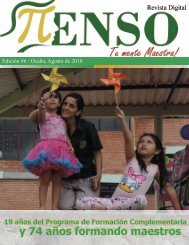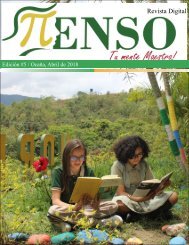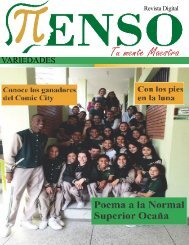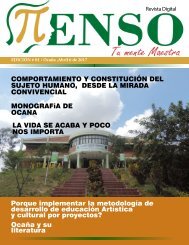You also want an ePaper? Increase the reach of your titles
YUMPU automatically turns print PDFs into web optimized ePapers that Google loves.
PROBLEM<br />
During the observation stage made<br />
in the institution and specifically in<br />
the 7th grades where this action<br />
research was conducted, several<br />
factors revealed that students from<br />
this level Basic II A2.2 does not<br />
have the needed space and time<br />
to exposure to the L2, this because<br />
teacher does not have the time or<br />
simply she was obligated to follow<br />
a curricula without any change to<br />
be implemented.<br />
Some difficulties were found when<br />
the students tried to speak in<br />
English, so the podcast strategy<br />
was implemented successfully,<br />
but with the exception that it<br />
was carried out using a sample<br />
of participants from higher levels<br />
comparing with the students level<br />
which I used.<br />
Taking into account the mentioned<br />
before this study contributed to<br />
explore how podcast creation<br />
by students from a lower-level<br />
could confront the students oral<br />
performance and improve English<br />
proficiency in all areas, but been<br />
focused on speaking skill.<br />
RATIONALE<br />
Krashens theory of the language<br />
learning, states that learning<br />
a foreign language has to be<br />
understood according to the<br />
natural way of learning, which<br />
is better represented firstly by<br />
the listening, then speaking,<br />
consequently reading and finally<br />
writing, but in most of the cases<br />
Colombian institutions follow a<br />
different order of development of<br />
these competences, making the<br />
task of encouraging the students<br />
to talk in a foreign language a<br />
challenging exercise.<br />
Previous studies conducted in<br />
this institution were carried out<br />
only in higher semester taking as<br />
a focus pronunciation. However,<br />
this study was focused on the<br />
students oral production in a basic<br />
II level, this became a challenge to<br />
students because they had never<br />
experienced a real approach to<br />
speak long paragraphs; in fact,<br />
they had not tried to give a main<br />
idea from a document.<br />
Likewise, the use of new<br />
technologies is an excellent tool<br />
to evaluate and give the proper<br />
feedback to students in a way<br />
that is now a tendency; using the<br />
new technologies is an excellent<br />
way to make students learn from<br />
real situations and improve at the<br />
same time their knowledge.<br />
It was expected to obtain an<br />
improvement of speaking skills,<br />
not just as an isolated skill, but at<br />
hand with the listening, due to<br />
the nature of interdependence<br />
of these, by using podcast as<br />
a technological tool that can<br />
provide a way to create from an<br />
established situation an audio<br />
file which can help students to<br />
be aware of their own learning<br />
process, even more, as a selfassessment<br />
instrument. Likewise,<br />
the augmentation of the time of<br />
exposure to the target language<br />
is one of the most difficult aspects<br />
when talking about the foreign<br />
language learning.<br />
THEORETICAL FRAMEWORK<br />
Studying a foreign language has<br />
been studied by several researchers<br />
in order to obtain the best approach<br />
to implement in the teaching of<br />
a second language. The central<br />
phenomenon being studied in this<br />
research could be selected into the<br />
communicative approach because<br />
of the techniques, materials and<br />
activities suggested to do by the<br />
pre service teacher.<br />
Because of this, it is better<br />
to understand the principles<br />
behind this successful approach.<br />
Nunan (1991) suggests five basic<br />
principles of the Communicative<br />
Approach in order to make real<br />
communication inside classrooms:<br />
1)An emphasis on learning to<br />
communicate through interaction<br />
in the target language.<br />
2)The introduction of authentic<br />
texts into the learning situation.<br />
3)The provision of opportunities<br />
for learners to focus, not only on<br />
language but also on the learning<br />
process itself.<br />
4)An enhancement of the learners<br />
own personal experience as<br />
important contributing elements<br />
to classroom learning.<br />
5)An attempt to link classroom<br />
language learning with language<br />
activities outside the classroom.<br />
The flag leading this proposal was<br />
the speaking skill improvement,<br />
thus, the main purpose of this<br />
project was to improve the<br />
speaking skills among José Rafael<br />
Faría Bermudez seventh grade<br />
students; according to Orwig<br />
(1998) Speaking is the productive<br />
skill in the oral mode.<br />
This, as the other skills, involves<br />
more than pronouncing words<br />
as in the case of speaking skills.<br />
Likewise, Horwitz, & Cope<br />
(1986); and Pichette (2009)<br />
agree that speaking in the target<br />
language tends to be the most<br />
challenging aspect of second<br />
language learning and teaching.<br />
Finally, Young (1990); Frantzen &<br />
Magnan (2005) Pichette (2009)<br />
illustrated that speaking produces<br />
more anxiety for most students<br />
compared to other skills such as<br />
reading, writing, and listening.<br />
7







